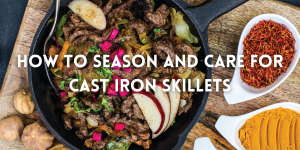Jan 11, 2022

Cast iron is among the oldest cookware available and has become a staple in many kitchens. This cookware is highly durable and easy to use for homeowners. However, all cast iron cookware needs to be properly seasoned and cared for. That is why keeping one seasoned and looking good as new can be quite a challenge. Together with AllHome, this article will provide you with every step you need to know about seasoning a cast iron cookware, and how to take care of your cast iron skillet such as the SLIQUE Sizzling Skillet to make sure that it lasts for a lifetime. It’s time to break out a wire brush, soap, and water; and give your pans some love again!
A cast-iron skillet is a large piece of iron that has been shaped into the shape of cookware. Iron is a gunmetal gray metal that is extremely reactive, rusting in minutes in humid air alone. If you try to cook in a bare iron pan, you’ll find that not only will it rust, but also your food will stick to it as well.
In this kind of situation, seasoning a cast iron skillet has nothing to do with salt or spices. Instead, it refers to a hard, protective layer created on cast iron by heating exceedingly thin layers of oil. When fat is heated, it attaches to the metal and to itself in a process known as polymerization, converting the fat into plastic. After enough layers of seasoning have been applied, the metal is protected by a hard, blackened skin rather than a greasy covering. Fortunately, cast iron possesses non-stick characteristics that make cooking simple–even the most stick-prone dishes can be a delight to cook. That’s why an older pan is preferable to a newer one: it’s already been through countless seasonings and re-heatings, so the coating improves with each use.
A seasoned skillet like LODGE 3.2 Quart Seasoned Cast Iron Combo Cooker is non-sticky, smooth, and lustrous. If food sticks to the surface of the pan seem dull or rusty, it’s time to re-season.
After having all the materials listed above, it is time to proceed with the actual procedure.
Now that your skillet is clean and dry, use a paper towel to spread a small amount of cooking oil all over your cast iron skillet, inside and out, including the handle. The idea is to apply the oil all over the cast iron pan, then buff it so completely that it no longer seems greasy in the least. Even a tiny quantity of extra oil on the pan might pool during seasoning, leaving solid droplets on the cooking surface, or become sticky if left unattended for a few days.
Place the greased baking pan in a preheated 450°F or 232°C ovens for 30 minutes. Keep your kitchen adequately ventilated because it could get a bit smokey. The oil will polymerize during this period, forming the first of numerous hard, plastic-like layers you’ll be applying. We’re using the oven for this procedure because it produces consistent heat that will help the oil spread evenly over the pan compared to a stovetop. Even the greatest cooktop burners will create hot and cold areas in your cast iron pan, resulting in inconsistent seasoning at first. Turning the pan upside down and putting a baking sheet or piece of foil below isn’t necessary, especially if you’ve wiped away all the extra oil. It’s only extra protection in case any excess oil runs and accumulates because gravity will draw it out of the pan.
When your 30 minutes is up, turn off the heat and let it cool fully before taking the pan out of your oven. Your cast iron pan is ready to go after it has cooled down. You can store it for future use or use your pan to cook any cuisine right away.
Cast iron cookware has proven long-term value. Chefs, experienced cooks, and passionate home cooks can vouch for a cast iron’s capacity to prepare a delicious meal. Just remember that repetition is the key to seasoning your cast iron cookware. As you can see, taking care of your cast iron skillet takes a little bit of practice, but with a little love and care, your cast iron pan will last a lifetime.
To shop for more cookware items, visit an AllHome store near you or ditch the stress and visit AllHome online. The AllHome online site offers fast delivery, cash on delivery, and easy payment terms. You may also follow us on our official Facebook page and Instagram accounts for more updates. Still can’t find what you are looking for? You can read more on our blog or watch our videos on our YouTube channel.
Like this article? Sign up for our newsletter to get more articles like these delivered straight to your inbox.
Customer Service Hotline: +63 968-2434-789